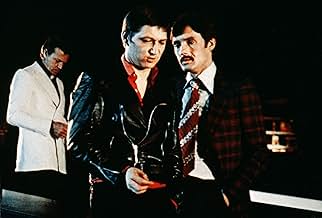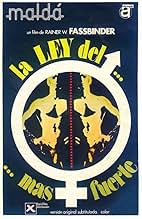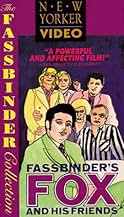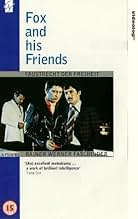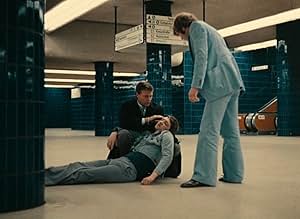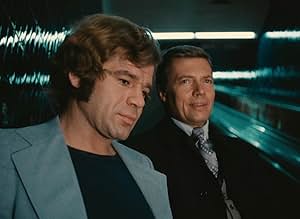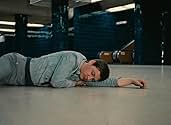NOTE IMDb
7,6/10
7,3 k
MA NOTE
Un ouvrier innocent et influençable remporte le gros lot mais se laisse exploiter par son nouveau petit ami bourgeois et son cercle d'amis matérialistes.Un ouvrier innocent et influençable remporte le gros lot mais se laisse exploiter par son nouveau petit ami bourgeois et son cercle d'amis matérialistes.Un ouvrier innocent et influençable remporte le gros lot mais se laisse exploiter par son nouveau petit ami bourgeois et son cercle d'amis matérialistes.
- Réalisation
- Scénario
- Casting principal
- Récompenses
- 1 victoire au total
Karlheinz Böhm
- Max
- (as Karl-Heinz Böhm)
Harry Baer
- Philip
- (as Harry Bär)
Karl-Heinz Staudenmeyer
- Krapp
- (as Karl Heinz Staudenmeier)
Marquard Bohm
- American Soldier
- (as Marquart Bohm)
Avis à la une
Fox and his Friends caused some controversy when it was first made - it was thought that this story of a gay sideshow worker who wins the lottery, only to be exploited to the hilt by his upper-class lover, was potentially homophobic. Fassbinder himself commented that the story could have been about a heterosexual relationship, but it wouldn't have been as clear.
Fassbinder himself plays Fox - the burly ugly duckling of German cinema miraculously slimmed down, looking almost handsome. Fox's street skills and good humour are undercut by his naivety, as his repellently snobbish boyfriend systematically scams him out of the thousands of marks he's won on the lottery. The story proceeds with ruthless inevitability, as Fox becomes more and more demoralised. Yet the film contains some of Fassbinder's sharpest comedy, particularly in a brilliantly embarrassing dinner party scene. RWF is excellent in the title role; amazing to think that the guy who wrote and directed the film (among so many others) could play a good-natured dimwit with such conviction.
Fassbinder himself plays Fox - the burly ugly duckling of German cinema miraculously slimmed down, looking almost handsome. Fox's street skills and good humour are undercut by his naivety, as his repellently snobbish boyfriend systematically scams him out of the thousands of marks he's won on the lottery. The story proceeds with ruthless inevitability, as Fox becomes more and more demoralised. Yet the film contains some of Fassbinder's sharpest comedy, particularly in a brilliantly embarrassing dinner party scene. RWF is excellent in the title role; amazing to think that the guy who wrote and directed the film (among so many others) could play a good-natured dimwit with such conviction.
"Faustrecht der Freiheit" occupies a valued place in my video collection. I find myself returning to it again and again, thoroughly enjoying Fassbinder's talent, which run throughout the film. Perceptive, witty and challenging, this drama provides astute observations on societal motivations, political aspirations and, above all, human nature.
Rainer Werner Fassbinder has long been honored as the 'bad boy' in European cinema, a writer/director/actor who repeatedly has taken chances and because of his brutal honesty has succeeded in making a stream of important films. FOX AND HIS FRIENDS dates back to 1975 and remains one of Fassbinder's most successful films. As with all of his films, Fassbinder deals with the homosexual subculture in Germany but his main message goes far beyond the characters he creates: the examination of how people manipulate people for personal gain and the destruction that produces is a recurring problem and one that this film certainly explores.
'Fox' - a nickname of Franz Bieberkopf - (acted with consummate skill by Fassbinder himself) is a lower class gay carny kid whose lover is arrested, leaving the carnival to collapse and leaving Fox without support. Enter handsome Max (Karlheinz Böhm), a wealthy antiques dealer, who picks up Fox, helps him buy the requisite 'lottery ticket' on which Fox bases his hopes for financial survival (!) via manipulative means, and takes him home, introducing Fox to his gay friends who regard Fox as scum but show obvious physical attraction to his rawness. Surprisingly Fox wins the lottery and suddenly has 500,000 DMs and with his new money, Max's friends abruptly see a target for obtaining that money. One of the friends named Eugen (Peter Chatel) takes Fox in as a lover and talks him into investing in Eugen's family business of bookbinding. Eugen's father Wolf (Adrian Hoven) and mother (Ulla Jacobsson) tolerate their son's life with a low class wretch, ridiculing his manners and lack of culture and education, but willingly take his money to salvage their business.
With a lover and a business and a role model to make him suave, Fox dons fancy clothes, banters with his old friends in a tawdry club, and makes the pretenses that at last he is secure and happy. But in time Fox is blamed for problems at the business and when his funds have been depleted on expensive vacations and apartments by the smarmy self-centered Eugen, Fox realizes that now without money he has no 'fancy friends', no lover, no security and his life becomes unbearable: the ending to the film is a tragedy beyond description.
Some would say the film is mannered in ways that depict stereotypes of the gay world (effeminate men, transvestites, opportunists, hustlers, etc), but Fassbinder is completely honest in his attempt to recreate a subculture of a specific time in Germany. And the characters are well written and well acted allowing us to look at Fassbinder's greater picture of depravity between social class antipathies. In many ways this is a difficult film to watch, but Fassbinder wisely places the main character whom he enacts in a place where his foibles and lack of higher class knowledge can be at once very humorous as well as pitiable. FOX AND HIS FRIENDS has some minor flaws but it has already become a classic in gay cinema repertoire. In German with English subtitles. Grady Harp
'Fox' - a nickname of Franz Bieberkopf - (acted with consummate skill by Fassbinder himself) is a lower class gay carny kid whose lover is arrested, leaving the carnival to collapse and leaving Fox without support. Enter handsome Max (Karlheinz Böhm), a wealthy antiques dealer, who picks up Fox, helps him buy the requisite 'lottery ticket' on which Fox bases his hopes for financial survival (!) via manipulative means, and takes him home, introducing Fox to his gay friends who regard Fox as scum but show obvious physical attraction to his rawness. Surprisingly Fox wins the lottery and suddenly has 500,000 DMs and with his new money, Max's friends abruptly see a target for obtaining that money. One of the friends named Eugen (Peter Chatel) takes Fox in as a lover and talks him into investing in Eugen's family business of bookbinding. Eugen's father Wolf (Adrian Hoven) and mother (Ulla Jacobsson) tolerate their son's life with a low class wretch, ridiculing his manners and lack of culture and education, but willingly take his money to salvage their business.
With a lover and a business and a role model to make him suave, Fox dons fancy clothes, banters with his old friends in a tawdry club, and makes the pretenses that at last he is secure and happy. But in time Fox is blamed for problems at the business and when his funds have been depleted on expensive vacations and apartments by the smarmy self-centered Eugen, Fox realizes that now without money he has no 'fancy friends', no lover, no security and his life becomes unbearable: the ending to the film is a tragedy beyond description.
Some would say the film is mannered in ways that depict stereotypes of the gay world (effeminate men, transvestites, opportunists, hustlers, etc), but Fassbinder is completely honest in his attempt to recreate a subculture of a specific time in Germany. And the characters are well written and well acted allowing us to look at Fassbinder's greater picture of depravity between social class antipathies. In many ways this is a difficult film to watch, but Fassbinder wisely places the main character whom he enacts in a place where his foibles and lack of higher class knowledge can be at once very humorous as well as pitiable. FOX AND HIS FRIENDS has some minor flaws but it has already become a classic in gay cinema repertoire. In German with English subtitles. Grady Harp
A powerful and harrowing melodrama and one of Fassbinder's most accessible movies,this is a must-see for all those interested in intelligent filmmaking.The tragic story of Fox is masterfully and poignantly handled by Fassbinder, while never slipping into sloppy sentimentality.At the same time the film explores sexual and political issues that are still very much relevant.
Man has mastered the art of wielding Power. Show him an inch and he will become your slave, give him an inch and he will become your master. And you watch while he takes the whole nine yards around your hearth & eventually your gravestone as well. Fox and his Friends resonates many themes from Ali: Fear eats the Soul, Fassbinder's soothing, Melancholic masterwork. In 'Ali' the protagonists Emi and Eli literally dance into each other's arms whereas in Fox Eugen and Fox clash and spar with unabashed animal magnetism. Franz Bieberkopf a.k.a Fox is a variety show entertainer named The Speaking Head. He is an "abnormal on an Itinerant stage," as one line introduces us to him. His lover is arrested, the show is packed off and so is Fox, who is too polite and cowardly to remonstrate the Manager's unfairness. A latter line alludes to Fox being picked up from a "pubic urinal." 'Fox and Friends' is unapologetic and brutal in its portrayal of Sexual Politics and Power Equations. That it bases its premise on homosexuality is a moot point. What the mood of the film conveys or what the acting styles convey is a hopeless, recursive, silent Machinery laughing away at genuine peoples efforts to wriggle out. Fox's luck changes after an escapade he engineers. His singular belief in winning a lottery drives him to the deed though he is initially mugged after he legally borrows an amount. Fox is picked up by an aristocratic gent named Max. This brief scene is memorable for the three lightning edit cuts and freeze frames that show a rendezvous being established through codes and signals.
Fox is introduced to Max's friends and is promptly attracted to and simultaneously repulsed by Eugen Thiess, a vain and ambitious bourgeois upstart. These are probably Fox's most liberating moments; when his street gab and penny tricks help him parry Eugen's sarcasm. But these defenses are soon exhausted when Fox's limitations loom large. He is ugly, poor, unschooled and "unskilled," as Eugen later points out. He is a homosexual from the streets. He will find no sympathy in a society that compels one to find power and to use it. His "proletariat potency," he knows is transient and viewed as a natural disposition to "boozing, scoffing and screwing." Eugen is an opportunistic entrepreneur who is quick to move in on Fox's vulnerability to acquire all the trappings that will win him society's approval.
The editing here has amaelstrom like effect; events unspooling at a breathless pace, sharply contrasting the layers being peeled off Max's slight persona. Eugentactfully manipulates Fox as he climbs the social ladder, rescuing a family business and acquiring tasteful 'possessions.' Fox is useful for as long as he has the prize money. Eugen's family is respectful to Fox when in need but quickly change colors when tides change. Fassbinder casts himself as Franz and his interpretation of the role is pitch perfect. Peter Chatel is suitably stoic as Eugen, the scheming lover. I could sense an icy chillness each time Karlheinz Bohm appeared on screen. It was no small surprise when my rusty memory discovered that my only introduction to his work was in Michael Powell's icy, voyeuristic 'Peeping Tom.' Bohm as Max the antiques dealer infuses a chilling, menacing air to his character. Intermittent and lurking, he lands up at important intervals in Fox's journey. Michael Ballhaus' (also a Kubrick and Scorsese regular) camera-work has a languid dexterity that together with Fassbinder's frames create moments of lingering pathos. Filters and geometrical motifs accentuate the fractured personalities and hollowness of meaningless lives. The contributions of other characters lend a dramatic weight to the final act of betrayal – the stampede of the Herd. Two performances merit special mention; Hans Zander as the snide barman Springer and Peter Kern as the lecherous florist 'Fatty' Schmidt. The subject matter of the film created a huge controversy upon release. Fassbinder was accused of being homophobic despite being openly homosexual. There are some nude male frontal scenes that have never been depicted so openly since. Some frames depict young boys as Adonis like props, objectified for sexual predators or as mute adornments in depraved Saturnalia. In one telling scene Fox blocks out the reflection of a nude boy to prevent Eugen from looking on. In a polarized world Fox is easy meat, even for the weakest of predators. His body is the only commodity he can sell and as Eugen explains " Fox is not the kind of guy money can make rich."
With 'Ali,' Fassbinder floored me. With 'Fox' he has me hooked for life. My personal rating- 7.8/10
Fox is introduced to Max's friends and is promptly attracted to and simultaneously repulsed by Eugen Thiess, a vain and ambitious bourgeois upstart. These are probably Fox's most liberating moments; when his street gab and penny tricks help him parry Eugen's sarcasm. But these defenses are soon exhausted when Fox's limitations loom large. He is ugly, poor, unschooled and "unskilled," as Eugen later points out. He is a homosexual from the streets. He will find no sympathy in a society that compels one to find power and to use it. His "proletariat potency," he knows is transient and viewed as a natural disposition to "boozing, scoffing and screwing." Eugen is an opportunistic entrepreneur who is quick to move in on Fox's vulnerability to acquire all the trappings that will win him society's approval.
The editing here has amaelstrom like effect; events unspooling at a breathless pace, sharply contrasting the layers being peeled off Max's slight persona. Eugentactfully manipulates Fox as he climbs the social ladder, rescuing a family business and acquiring tasteful 'possessions.' Fox is useful for as long as he has the prize money. Eugen's family is respectful to Fox when in need but quickly change colors when tides change. Fassbinder casts himself as Franz and his interpretation of the role is pitch perfect. Peter Chatel is suitably stoic as Eugen, the scheming lover. I could sense an icy chillness each time Karlheinz Bohm appeared on screen. It was no small surprise when my rusty memory discovered that my only introduction to his work was in Michael Powell's icy, voyeuristic 'Peeping Tom.' Bohm as Max the antiques dealer infuses a chilling, menacing air to his character. Intermittent and lurking, he lands up at important intervals in Fox's journey. Michael Ballhaus' (also a Kubrick and Scorsese regular) camera-work has a languid dexterity that together with Fassbinder's frames create moments of lingering pathos. Filters and geometrical motifs accentuate the fractured personalities and hollowness of meaningless lives. The contributions of other characters lend a dramatic weight to the final act of betrayal – the stampede of the Herd. Two performances merit special mention; Hans Zander as the snide barman Springer and Peter Kern as the lecherous florist 'Fatty' Schmidt. The subject matter of the film created a huge controversy upon release. Fassbinder was accused of being homophobic despite being openly homosexual. There are some nude male frontal scenes that have never been depicted so openly since. Some frames depict young boys as Adonis like props, objectified for sexual predators or as mute adornments in depraved Saturnalia. In one telling scene Fox blocks out the reflection of a nude boy to prevent Eugen from looking on. In a polarized world Fox is easy meat, even for the weakest of predators. His body is the only commodity he can sell and as Eugen explains " Fox is not the kind of guy money can make rich."
With 'Ali,' Fassbinder floored me. With 'Fox' he has me hooked for life. My personal rating- 7.8/10
Le saviez-vous
- AnecdotesThe normally overweight Rainer Werner Fassbinder dieted strenuously to lose weight in order to play the role of Fox, which included a full-frontal nude scene.
- GaffesOne character mentions that one could receive money from the city for collecting June bugs (May beetles, genus Phyllophaga) as children. In reality, children were paid for collecting Colorado potato beetles (Leptinotarsa decemlineata), an invasive species.
Meilleurs choix
Connectez-vous pour évaluer et suivre la liste de favoris afin de recevoir des recommandations personnalisées
- How long is Fox and His Friends?Alimenté par Alexa
Détails
- Date de sortie
- Pays d’origine
- Sites officiels
- Langues
- Aussi connu sous le nom de
- La ley del más fuerte
- Lieux de tournage
- Petersplatz, Munich, Bavière, Allemagne(clock tower)
- Sociétés de production
- Voir plus de crédits d'entreprise sur IMDbPro
Box-office
- Budget
- 450 000 DEM (estimé)
- Montant brut aux États-Unis et au Canada
- 8 144 $US
- Week-end de sortie aux États-Unis et au Canada
- 11 623 $US
- 16 févr. 2003
- Montant brut mondial
- 8 158 $US
- Durée
- 2h 4min(124 min)
- Mixage
- Rapport de forme
- 1.37 : 1
Contribuer à cette page
Suggérer une modification ou ajouter du contenu manquant

